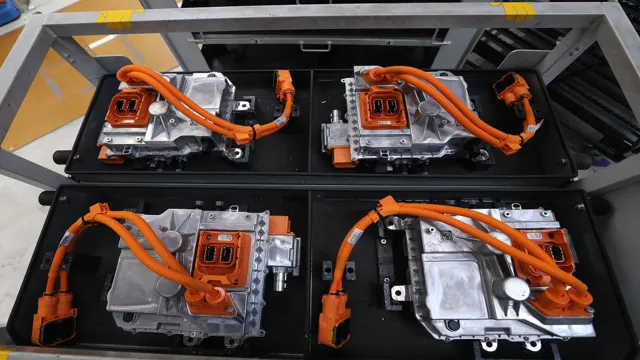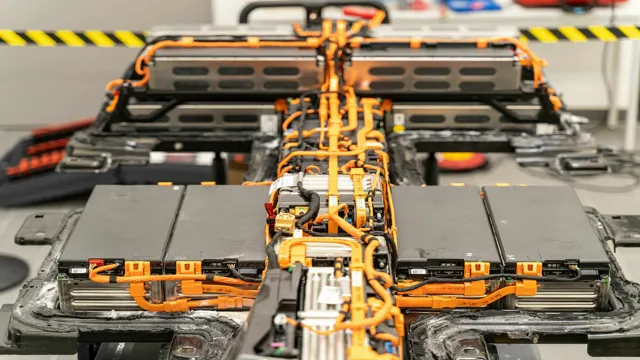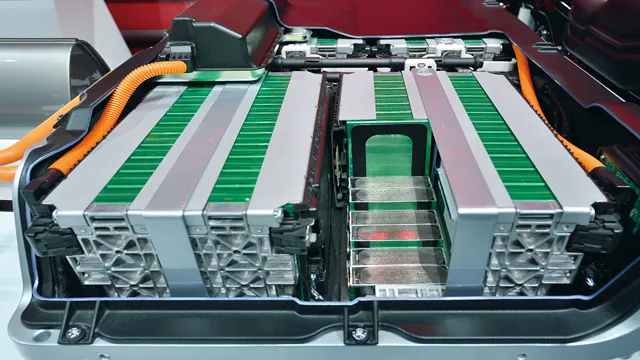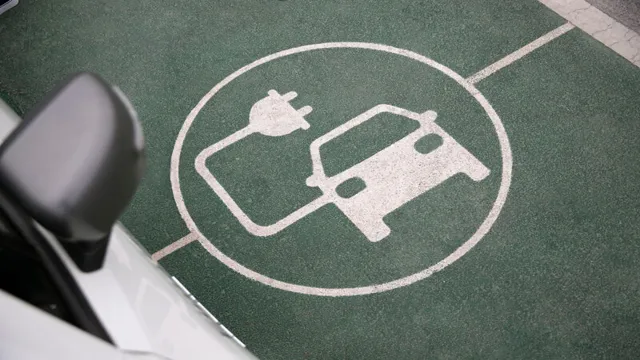Unlocking the Secrets of Electric Car Battery Pack Lifespan: Know How Long Your Batteries Will Last!
Electric cars have been around for some time now, and more and more people are shifting their focus towards electric cars. It’s no surprise that electric cars have an edge over traditional gas-powered cars in terms of fuel efficiency, eco-friendliness, and maintenance costs. However, the one question that car buyers have been asking lately is how long electric car batteries last? The lifespan of electric car batteries is an essential factor to consider before buying an electric car.
It’s crucial to know the answer to how long the battery lasts to make an informed decision. In this blog, we’ll discuss the lifespan of electric car batteries and factors that affect the battery life of electric cars.
What is Battery Lifespan?
Electric car battery pack lifespan is the extent to which a battery can provide power to an electric vehicle. A battery’s lifespan is influenced by various factors, including usage, environment, and maintenance. In general, the more frequently you charge and discharge your battery, the shorter its lifespan becomes.
Similarly, extreme temperatures and humidity levels have a significant impact on battery health, as they can cause chemical reactions that degrade the battery’s performance over time. Routine inspections and maintenance can help extend the lifespan of your battery by ensuring that it is charging and discharging correctly and that all connections are secure and undamaged. Overall, the lifespan of an electric car battery pack can vary depending on several factors, but they are generally designed to last several years and several thousand miles of driving before requiring replacement.
So, if you’re considering purchasing an electric car, you can feel confident knowing that modern electric car batteries are built to last.
Defining Battery Lifespan for Electric Cars
Battery lifespan is the measure of how long a battery can retain its specified capacity and performance before losing its ability to hold a charge. In the context of electric cars, battery lifespan refers to how long the battery can maintain its power output before it needs to be replaced. This is an important consideration for electric car buyers as it directly affects the value and total cost of ownership of the vehicle.
The lifespan of electric vehicle batteries depends on a variety of factors including charging habits, environmental conditions, and the type of battery chemistry used. In general, most electric cars batteries have a lifespan of around 100,000 miles or more. However, advances in battery technology are constantly improving battery lifespans and reducing costs, making electric cars a more practical and affordable alternative to traditional gas-powered vehicles.

Factors Affecting Battery Lifespan
Electric car battery pack lifespan can be affected by a number of factors. One of the most important factors is the frequency of charging and discharging. The more frequently the battery is charged and discharged, the more quickly it will degrade.
Another key factor is temperature. If the battery gets too hot or too cold, its lifespan can be significantly reduced. Additionally, factors such as driving style, terrain, and the weight of the vehicle can all impact the lifespan of the battery.
It is important for electric car owners to be aware of these factors and to take steps to maximize the lifespan of their battery pack, such as avoiding rapid charging or frequent deep discharging. With proper care and maintenance, an electric car battery pack can last for many years, providing reliable, emissions-free transportation.
Temperature and Its Impact
Temperature is a crucial factor that impacts the lifespan of batteries. High temperatures can significantly reduce battery performance and shorten their lifespan. This is because the heat causes the battery’s fluids to evaporate faster, leading to increased internal resistance, which results in a shorter lifespan.
Extreme cold can also affect battery performance, as the chemical reactions in the battery slow down in cold temperatures, reducing its capacity to hold a charge. Additionally, charging a battery in high temperatures can cause it to overheat and become damaged, reducing its lifespan even further. Therefore, it is important to keep batteries at a moderate temperature and avoid exposing them to extreme temperatures to improve their longevity and performance.
Proper storage and maintenance of batteries can help prevent damage and extend their lifespan. So, it is important to keep this in mind when dealing with batteries to avoid any damage or reduced performance.
Driving Habits and Patterns
When it comes to the lifespan of your car battery, your driving habits and patterns can play a significant role. The frequency and length of your drives can affect the overall health of your battery. Short trips can cause strain on the battery as it does not have enough time to fully recharge.
On the other hand, long drives can help maintain the battery by allowing it to recharge fully. Additionally, the use of electronic components like air conditioning, headlights, and infotainment systems can also impact the battery life. Consistent and excessive use of these components can drain the battery faster than it can recharge, resulting in a shorter lifespan.
It is important to be mindful of your driving habits and patterns to ensure you get the most out of your car battery.
Charging Frequency
When it comes to charging your phone or other mobile devices, the frequency at which you plug them in can make a big difference in their overall lifespan. One of the biggest factors affecting battery health is the number of charge cycles it goes through. Each time you charge your device to 100%, and then let it drain down to zero, that counts as one cycle.
The more cycles your battery goes through, the more its lifespan will decrease. That’s why it’s generally recommended to only charge your device when its battery level drops to around 20-30%, and to try not to let it fully drain before charging again. Additionally, using a lower wattage charger can be better for your battery in the long run, as it puts less strain on it during the charging process.
By being mindful of how often you charge your devices and the type of charger you use, you can help prolong the life of your battery and get more use out of your devices over time.
Battery Capacity and Chemistry
When it comes to the lifespan of a battery, there are a few factors that play a significant role. One of the crucial determinants is the battery capacity and chemistry. The capacity of a battery refers to the amount of energy that it can store.
The higher the capacity, the longer the battery will last on a single charge. However, the chemistry of the battery can also impact its lifespan. Different chemistries have different characteristics, and some may be more prone to degradation over time than others.
For example, lithium-ion batteries, which are commonly used in smartphones and laptops, tend to have a shorter lifespan than lead-acid batteries, which are often used in cars and boats. It’s essential to consider the chemistry of a battery when selecting a device or system that relies on it. Understanding this correlation between battery capacity and chemistry can help you make informed decisions that will extend the lifespan of your devices and reduce the frequency of replacements.
How Long Do Electric Car Batteries Last?
Electric car battery pack lifespan is a common concern among prospective EV owners. The good news is that most electric car batteries last long, with a lifespan ranging anywhere from 5 to 15 years, depending on factors such as usage, driving habits, temperature, and maintenance. Additionally, many EV manufacturers offer warranty programs that can cover the battery pack for up to 8 years or 100,000 miles, providing car owners with the peace of mind that their investment is protected.
However, as with any rechargeable battery, the lifespan will eventually come to an end, and the battery will need to be replaced. Luckily, most EV battery packs are designed to be easily replaceable and can often be recycled. So, while electric car batteries may not last forever, they can provide a sustainable and environmentally-friendly option for transportation.
Current Industry Standards and Averages
One of the most common questions that people ask about electric cars is how long their batteries last. On average, electric car batteries last for about 100,000 miles or eight to ten years. However, this lifespan can vary depending on a few factors such as how often the battery is charged, how much it’s used, and the temperature it’s exposed to.
Charging a battery too frequently or exposing it to extreme temperatures can cause it to degrade more quickly. Nonetheless, with proper maintenance, most electric car batteries should last for several years before needing to be replaced. It’s worth noting that some newer electric cars come with warranties that last for up to eight years or 100,000 miles, so consumers don’t have to worry too much about battery replacements during that period.
All in all, electric car batteries have come a long way in terms of durability and longevity, and with advancements in technology, we can expect them to continue evolving in the years to come.
Real-World Examples of Battery Lifespan
When it comes to electric car batteries, many people wonder how long they will last before needing to be replaced. The truth is, the lifespan of an electric car battery can vary widely depending on a number of factors. For example, the type of battery, the size of the battery, and the driving habits of the car’s owner can all play a role in determining how long the battery will last.
But, as a general rule, most electric car batteries can last anywhere from 10 to 15 years before needing to be replaced. Of course, this is just an estimate, and the actual lifespan of a battery will depend on a number of factors. But, as electric cars become more common, and as battery technology continues to improve, it’s likely that we’ll see even longer battery lifespans in the future.
Maximizing Electric Car Battery Lifespan
As electric vehicles become more popular, understanding how to maximize the lifespan of an electric car battery pack is becoming increasingly important. To ensure that your battery can deliver optimal performance for years to come, there are a few key steps you can take. One of the most important is to regularly charge your battery to only 80% of its capacity.
This can help to minimize wear and tear on the battery, since overcharging can cause damage to the cells. It’s also important to avoid extreme temperatures, which can put additional strain on the battery. By taking care of your electric car battery pack, you can get the most out of your vehicle while minimizing the need for expensive maintenance or replacement.
Tips for Extending Battery Life
Electric Car Battery Lifespan If you’re looking to maximize the lifespan of your electric car battery, there are a few tips to keep in mind. First and foremost, try to avoid frequent fast charging sessions, as these can put a lot of stress on your battery and shorten its lifespan. Instead, opt for slower charging sessions whenever possible, and aim to keep your battery level between 20% and 80% as often as you can.
Additionally, practicing good driving habits can also help to extend your battery’s lifespan. Avoid harsh braking and sudden acceleration, and try to drive at moderate speeds whenever possible. By taking these simple steps, you can help to ensure that your electric car battery lasts for as long as possible, allowing you to continue enjoying the benefits of electric transportation for many years to come.
Maintenance and Care for Electric Car Batteries
As electric vehicles (EVs) become more popular, it’s essential to understand that their batteries require maintenance and care to maximize their lifespan. While EV batteries are designed to last long, there are still steps you can take to ensure they stay healthy. Firstly, keep the battery charged between 20-80% to avoid overcharging or draining it completely, leading to battery damage.
Secondly, avoid exposing the battery to extreme temperatures as they can reduce battery life and efficiency. Lastly, it’s crucial to schedule regular maintenance for the battery to ensure the system runs smoothly. By keeping these points in mind, you can ensure that your battery remains in top shape, giving you the maximum possible miles from your investment.
Remember, a well-maintained battery means a well-powered car, so take care of it, and it will take care of you.
Conclusion and Final Thoughts
In conclusion, the lifespan of an electric car battery pack is like a finely tuned dance. It requires balance, precision, and occasional maintenance to keep the energy flowing. But with advancements in technology and a growing interest in sustainable transportation, the electric car battery pack’s lifespan is sure to keep the rhythm of the road going for many miles to come.
“
FAQs
What is the typical lifespan of an electric car battery pack?
The typical lifespan of an electric car battery pack is around 8-10 years, although it can vary depending on factors such as usage patterns, climate, and maintenance.
How much does it cost to replace an electric car battery pack?
The cost of replacing an electric car battery pack can vary greatly depending on the make and model of the vehicle, but can range from $3,000 to $8,000 or more.
Can an electric car battery pack be recycled?
Yes, most electric car battery packs can be recycled. In fact, many automakers have programs in place to ensure that batteries are properly recycled at the end of their useful life.
What factors can affect the lifespan of an electric car battery pack?
There are several factors that can affect the lifespan of an electric car battery pack, including temperature, charging schedule and patterns, vehicle usage patterns, and maintenance practices.






